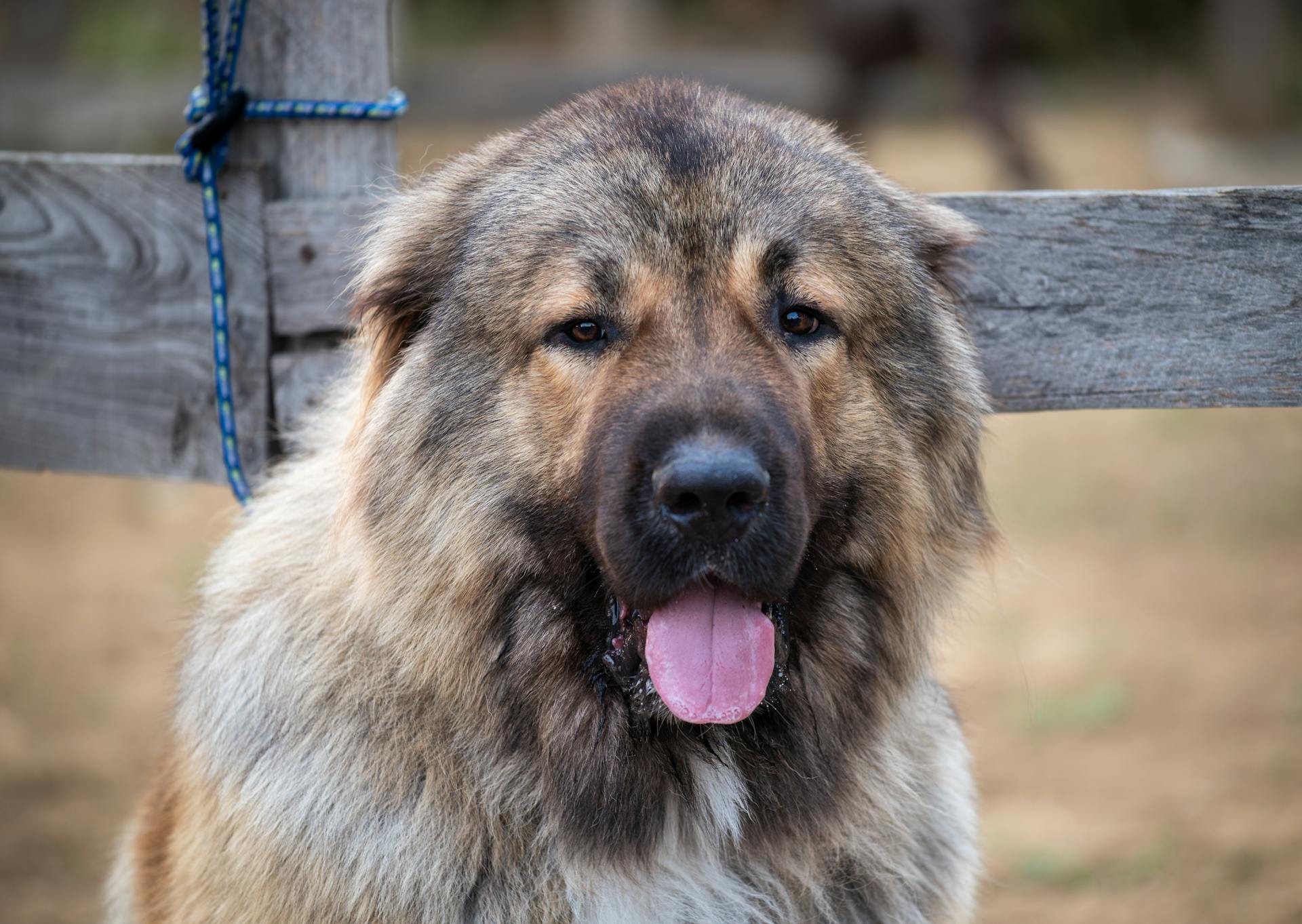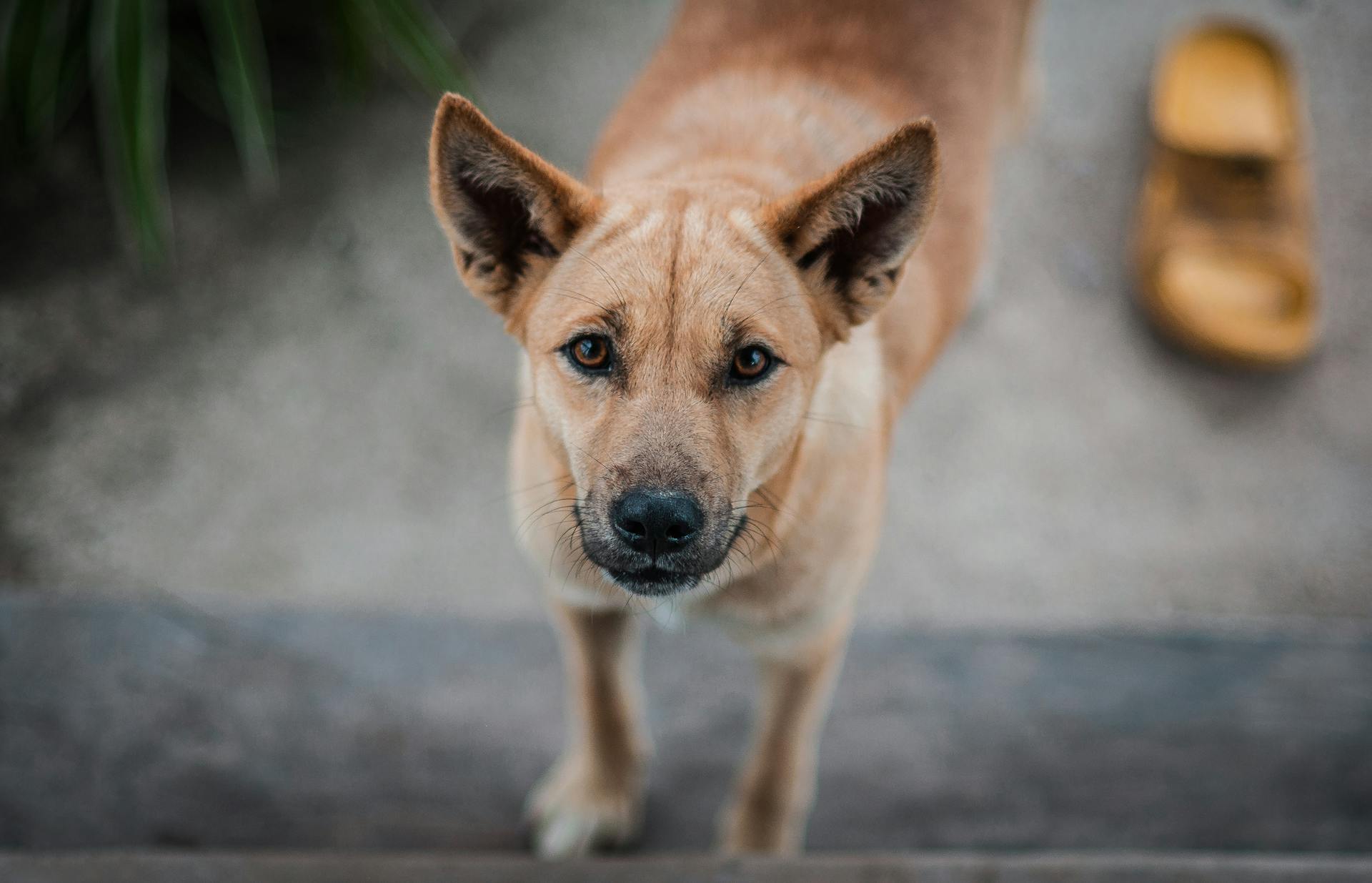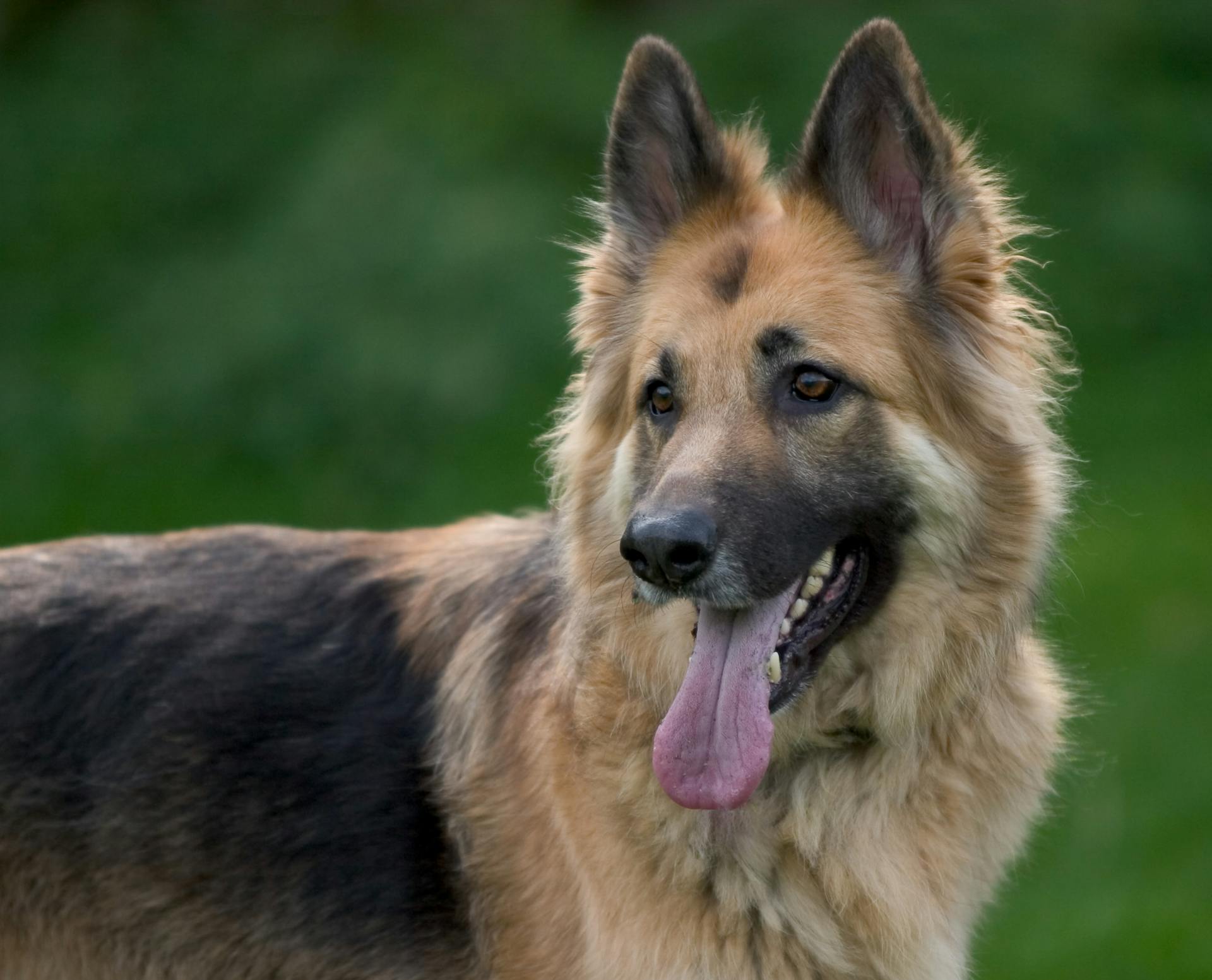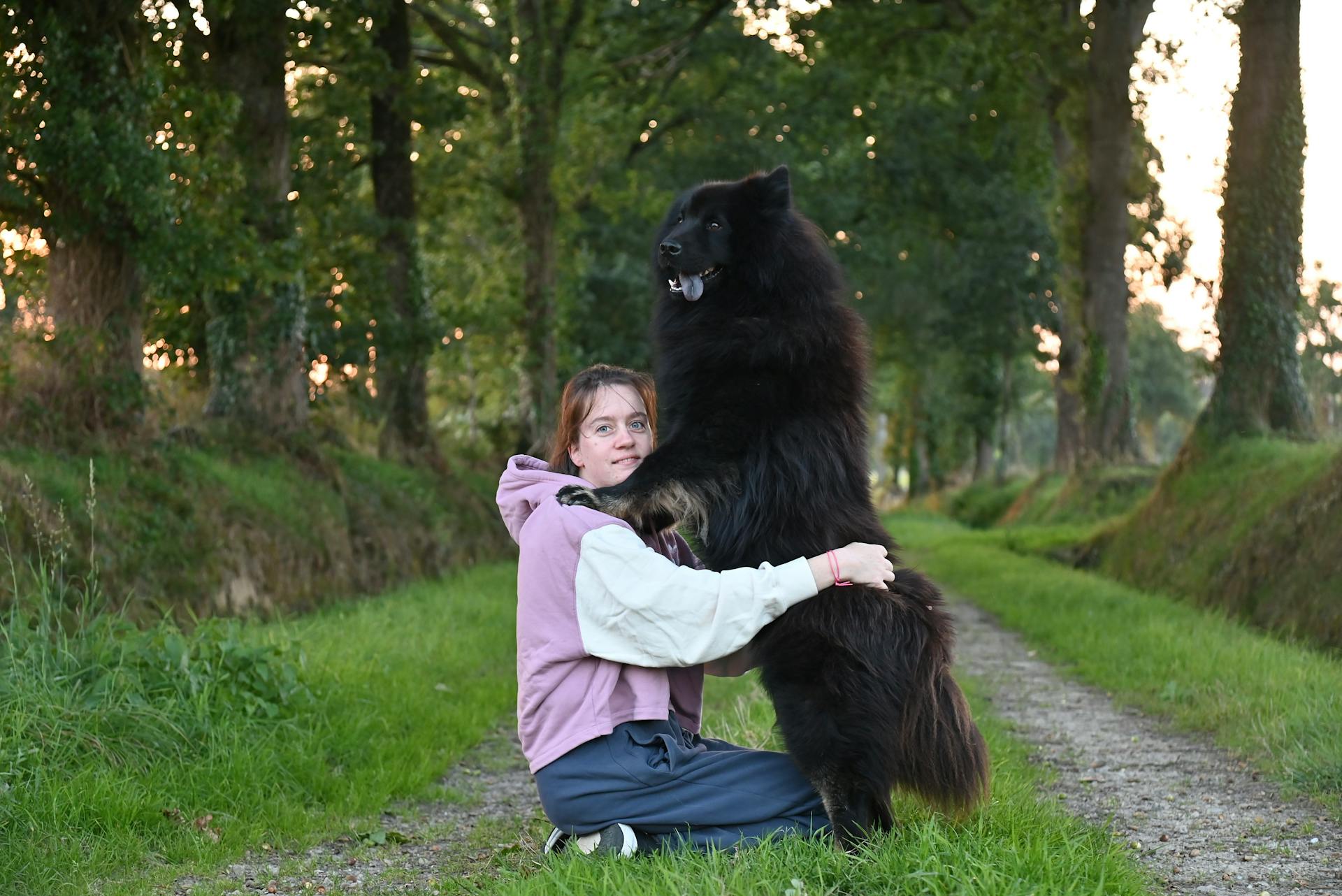
The American Alsatian and German Shepherd are two popular breeds that often get confused with each other due to their similar origins and physical characteristics.
One key difference between the two breeds is their size, with the American Alsatian generally being larger and more muscular than the German Shepherd.
The American Alsatian was developed in the 1980s to create a breed that was similar to the German Shepherd but with a more rugged and robust build.
They both have a short, dense coat that requires regular grooming to prevent matting and tangling, but the American Alsatian's coat is often thicker and more prone to shedding.
Intriguing read: How Often Should German Shepherds Be Groomed
Breed Details
The American Alsatian breed is quite impressive, with most canines measuring over two feet tall at the withers and weighing around a hundred pounds as adults.
Their powerfully built physique is evident in their broad chest, thick neck, and strong legs, which provide them with extra stability and make them very sure-footed.
Their rectangular profile is a result of their backs being generally slightly longer than they are tall.
Their large, slightly rounded skull flattens out somewhat as it approaches the eyes, giving them a distinctive look.
Their almond-shaped eyes can range from brown to yellow, but those that are closer to yellow are preferred.
Their upright triangular ears are wide set and shorter, with a rounded tip.
Straight tails are preferred over longer or curled over tails.
Health
When it comes to the health of American Alsatians, there are some key concerns to be aware of. American Alsatians are prone to hip and elbow dysplasia, which can lead to arthritis and other mobility issues.
One of the most serious health concerns for American Alsatians is gastric dilation volvulus, also known as bloat. This is a life-threatening condition that requires immediate veterinary attention.
Regular check-ups with a veterinarian can help identify potential health issues early on. This may include X-rays, cardiac ultrasound, and a full body physical examination.
If you're considering bringing an American Alsatian into your family, be aware that they may also be prone to allergies. Your veterinarian can perform allergy testing to help identify any potential issues.
Here are some common health concerns to be aware of in American Alsatians:
- Hip and elbow dysplasia
- Arthritis
- Gastric dilation volvulus (GDV) or bloat
Some common health tests for American Alsatians include:
- X-Rays
- Cardiac Ultrasound
- Full Body Physical Examination
- Allergy Testing
Temperament and Behavior
The American Alsatian is a large dog, but they're surprisingly calm indoors and out. They're bred to be a companion animal, not a guard dog, so they're not naturally protective of their territory.
These dogs are generally tolerant of strangers and other animals, but some can be more aloof or even shy. However, conscientious breeding practices are addressing this tendency.
One thing to note about the American Alsatian is that they're not overly boisterous, making them a great fit for families with small children. Just remember to always supervise interactions between dogs and small kids.
Broaden your view: Small German Shepherds
Despite their size, American Alsatians are typically trustworthy and not prone to aggression. They're more likely to show a stranger around the property than try to defend it.
Their naturally accepting and mellow nature makes them excellent therapy dogs. Some have even been trained for search and rescue work, taking advantage of their calm and focused demeanor.
Lifestyle and Exercise
The American Alsatian and German Shepherd both require regular exercise to stay in peak condition, but they have different needs when it comes to activity levels.
American Alsatian owners should aim for at least an hour of moderate activity each day, which can be in the form of walks or playtime.
In warmer climates, both breeds should be closely monitored to prevent heat-related issues.
A fresh viewpoint: American Alsatian Dog
Naming Two Dogs
The German Shepherd breed was originally called Deustcher Schaferhound, meaning German Shepherd Dog, back in 1899. They were raised as working dogs.
During World War I and II, the breed became incredibly popular due to its agility and intelligence. The British were so impressed that they gave it a new name, Alsatian, as a way to distance themselves from the breed's German roots.

The name change from German Shepherd to Alsatian happened around 1925, when the American Kennel Club and the Alsace club reverted back to the original name. However, the Kennel Club of UK continued to call them Alsatian, even placing the name German Shepherd within brackets.
The breed's name changed again in 1977, with the primary name becoming German Shepherd and the name Alsatian being placed within brackets. It wasn't until 2010 that the name Alsatian was finally dropped and the breed is now known as German Shepherd.
Breed Maintenance
The American Alsatian has a low odor due to their thick coat that repels dirt and debris, so bathing is only required on an occasional basis.
Their thick coat requires brushing every few days year-round to manage their moderate shedding.
You'll likely need to brush your American Alsatian daily if not more often when they're shedding their undercoat, and they'll still leave a trail of hair.
Their undercoat is extremely thick and comes in for winter months, but almost completely sheds during spring, reducing it to almost nothing.
Brushing their teeth a few times a week is essential for their dental care, while trimming their nails monthly will keep them in good shape.
Their thick coat is somewhat coarse and moderate in length, making it a bit more high-maintenance than other breeds.
Activity Requirements
American Alsatians need at least an hour of moderate activity each day to stay in peak condition.
Their exercise needs are relatively moderate, but they can thrive with longer walks if you prefer. They're well built and can handle longer distances with ease.
In general, they're adaptable to living in either a large home with a yard or a smaller apartment. However, they can be more susceptible to heat and should be closely monitored in warmer climates.
Their thick winter coats make them well-suited to colder climates, but you'll want to keep an eye on them in hot weather.
Comparison and Similarities
Both the American Alsatian and German Shepherd are large breeds, with the American Alsatian typically weighing between 100-150 pounds and standing 25-29 inches tall, while the German Shepherd weighs between 75-95 pounds and stands 24-26 inches tall.
The American Alsatian has a similar appearance to the German Shepherd, with a muscular build and a double coat that sheds heavily.
The American Alsatian is generally easier to train than the German Shepherd, requiring less socialization and obedience training.
Both breeds are highly intelligent and responsive to commands, but the American Alsatian is more independent and less prone to anxiety.
The German Shepherd requires more exercise and mental stimulation than the American Alsatian, with a daily need for at least an hour of physical activity and training.
The American Alsatian is generally less prone to health issues than the German Shepherd, with a lower incidence of hip dysplasia and other joint problems.
A different take: Books on Training German Shepherds
Frequently Asked Questions
What breeds make an American Alsatian?
The American Alsatian is a cross between a German Shepherd and a Malamute, combining the best traits of both breeds. This unique mix creates a distinctive and impressive dog.
Sources
- https://vosd.in/alsatian-vs-german-shepherd-difference-explained/
- https://www.hepper.com/alsatian-vs-german-shepherd/
- https://wagwalking.com/breed/american-alsatian
- http://www.differencebetween.net/science/nature/difference-between-alsatian-and-german-shepherd/
- https://americanalsatian.wordpress.com/2013/07/19/the-american-alsatian/
Featured Images: pexels.com


